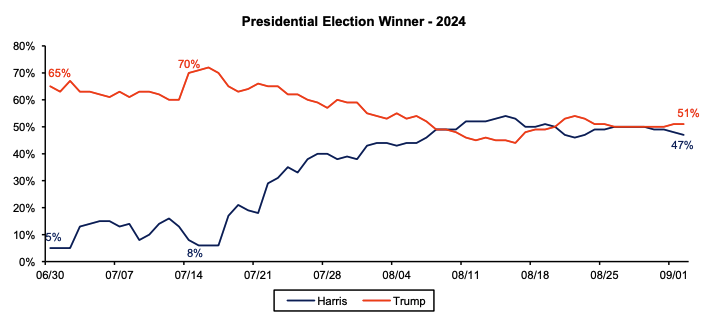Blockchain immutability could help prevent censorship scandals, Bernstein analysts say
Quick Take Bernstein analysts highlighted blockchain’s role in preventing censorship and pursuing truth amid AI-generated content abundance. The analysts’ comments follow a series of censorship rows including Telegram CEO Pavel Durov’s arrest in France, X’s dispute with Brazil and U.S. election fact-checking.
In an age of AI-generated content abundance and concerns over censorship, analysts at research and brokerage firm Bernstein said blockchain technology has a unique role in the pursuit of truth.
Looking back on a series of events in recent weeks, including Facebook founder Mark Zuckerberg’s acknowledgment of consenting to Covid-related censorship in 2021, Telegram CEO Pavel Durov’s arrest in France for failing to moderate content and X’s feud with Brazil over refusing to remove alleged misinformation, blockchain technology’s “immutability of ledger” trait can prevent censorship, Gautam Chhugani, Mahika Sapra and Sanskar Chindalia wrote in a note to clients on Tuesday.
While traditional media is ramping up its fact-checking on politicians amid the U.S. election cycle and X attempts to moderate content via its community notes feature, avoiding taking down posts or banning accounts by adding context, Telegram takes a more extreme stand on censorship, the analysts said.
Unlike other messaging apps, Telegram doesn’t use end-to-end encryption for data but relies on decentralized storage across multiple jurisdictions, making data retrieval difficult. It also uses blockchain for cross-border money transfers and supports blockchain apps integrated with its crypto wallet. Despite its stance on privacy, governments demand more cooperation from Telegram on serious issues like child abuse and illicit activities. However, according to the analysts, Telegram strongly opposes censorship, fearing it could lead to broader suppression of political views and freedom of speech, according to analysts.
Chhugani, Sapra and Chindalia said this posed some critical questions surrounding what truth is, who decides what’s true, whether governments should decide truth and pressure media to censor content or open backdoors for monitoring, and how AI content should be moderated compared to human-generated material.
Blockchain-based social media and the democratization of markets
While attempts have been made to launch decentralized social media platforms on blockchain, such as Farcaster and Lens, they have only generated modest user traction so far and suffer from challenges with user network effect, as most users still prefer centralized platforms, the analysts said.
However, blockchain’s democratization of markets, enabling users to tokenize and create a market for every event, has a particular way of relaying truth by adding “skin in the game,” they argued.
One example they highlight is the use of the Polygon-based decentralized predictions platform Polymarket in the run-up to the U.S. presidential elections. If users believe traditional election polls are biased, they can follow the Polymarket odds instead for any divergence with the polls, Chhugani, Sapra and Chindalia said.
On Monday, U.S. Vice President Kamala Harris's odds of winning the November election dropped to 47% on Polymarket, with Donald Trump's odds reaching 51% as of Tuesday. Trump surpassed Harris after the candidates were previously tied at 50-50, and the Vice President led earlier in August. Those figures compare to national polling of 47% to 44% in Harris’ favor, the analysts noted.

Presidential election winner odds on Polymarket. Source: Bernstein.
In terms of tackling the increase in AI-generated content, the Bernstein analysts suggested advances in zero-knowledge proofs could help certify human content and add notes to differentiate it from AI content.
“As AI brings about abundance, productivity and creativity, blockchain balances it by pursuing truth, scarcity and decentralization of power,” they said.
Disclaimer: The content of this article solely reflects the author's opinion and does not represent the platform in any capacity. This article is not intended to serve as a reference for making investment decisions.
You may also like
5 Cardano Rivals to Watch as Founder Predicts Ethereum Will Die by 2040
Resilient Long-Term Bitcoin Holders Confidently Add 635K BTC Since January Amid Market Shifts
Top Searched Crypto Projects of Today
Ubisoft + blockchain = Might&Magic goes crypto
